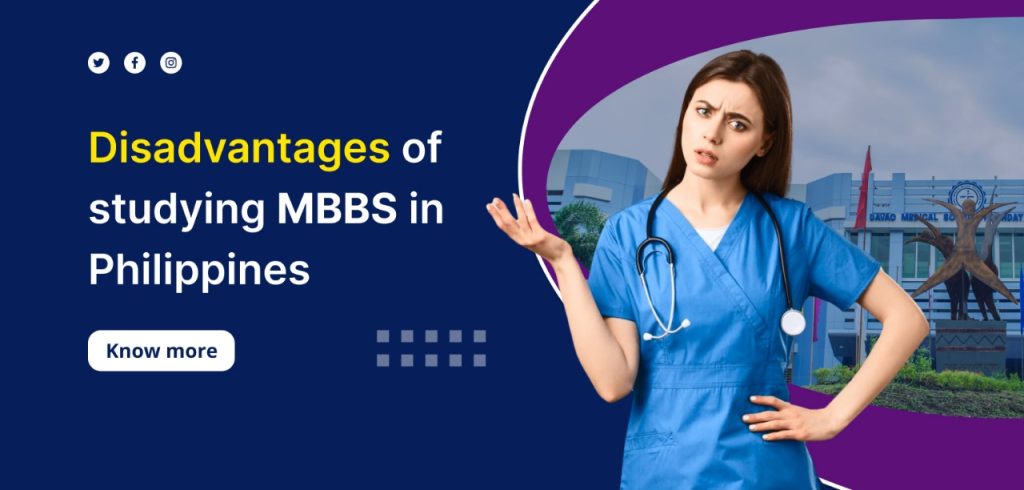
Disadvantages of studying MBBS in Philippines
Studying MBBS (Bachelor of Medicine, Bachelor of Surgery) in the Philippines has become a popular option for international students due to the relatively lower cost and shorter duration compared to other countries. However, there are several disadvantages that students should consider before making a decision:
1. Recognition and Licensing Issues
- Recognition in Home Country: Some countries have specific requirements for recognizing medical degrees obtained abroad. Graduates may need to pass additional exams or fulfill specific criteria to practice in their home country.
- Licensing Exams: Graduates may need to pass exams such as the FMGE (Foreign Medical Graduate Examination) in India, USMLE (United States Medical Licensing Examination) for the USA, or PLAB (Professional and Linguistic Assessments Board) test for the UK, which can be challenging and require additional preparation.
2. Quality of Education
- Variation in Standards: The quality of education can vary significantly between institutions in the Philippines. Some schools may not meet the standards of medical education expected in other countries.
- Clinical Exposure: While some universities provide good clinical exposure, others may lack sufficient facilities and opportunities for hands-on experience, which is crucial for medical training.
3. Cultural and Language Barriers
- Variation in Standards: The quality of education can vary significantly between institutions in the Philippines. Some schools may not meet the standards of medical education expected in other countries.
- Clinical Exposure: While some universities provide good clinical exposure, others may lack sufficient facilities and opportunities for hands-on experience, which is crucial for medical training.
4. Living Conditions and Safety
- Quality of Life: The living conditions may not be up to the standards that international students are accustomed to. Issues such as accommodation, healthcare, and general infrastructure can vary widely.
- Safety Concerns: While many parts of the Philippines are safe, there are regions where safety can be a concern due to political instability, natural disasters, or crime rates.
5. Limited Internship and Residency Opportunities
- Internship Quality: The quality and extent of internship opportunities can vary, which may impact the practical experience gained by the students.
- Residency Challenges: Securing a residency position in another country can be challenging due to different medical education systems and regulations.
6. Return on Investment
- Cost vs. Earnings: While the initial cost of education may be lower, the long-term return on investment may be less favourable if the degree is not well-recognized or if graduates struggle to pass licensing exams and secure high-paying jobs.
7. Accreditation and Approval Issues
- Accreditation: Not all medical schools in the Philippines are accredited by recognized international bodies, which can impact the ability to practice medicine in other countries.
- Approval from Medical Councils: Graduates may face issues if the medical council of their home country does not recognize the degree or requires additional certifications.
8. Differences in Medical Practice
- Curriculum Differences: The curriculum may not be aligned with the medical practice standards of other countries, leading to difficulties in adapting to medical systems abroad.
- Disease Prevalence: The medical education might focus on diseases prevalent in the Philippines, which may differ significantly from those in the student’s home country or where they intend to practice.
9. Support System and Resources
- Limited Support for Foreign Students: There may be limited support and resources available for international students in terms of career guidance, mental health services, and academic support.
- Alumni Network: A smaller alumni network in their home country can limit professional networking opportunities for international students.
10. Impact on Career Path
- Specialization Options: Graduates may face limitations in choosing and pursuing medical specializations due to different regulatory and educational systems.
- Reputation: Graduating from a less prestigious or less well-known medical school can impact career opportunities and professional credibility.
While the Philippines offers several benefits for medical education, such as affordability and the use of English as a medium of instruction, these potential disadvantages should be carefully weighed to ensure it aligns with your long-term career goals and requirements in your home country.
Conclusion
Pursuing an MBBS in the Philippines presents several advantages for Indian students, especially when compared to the potential disadvantages. Notably, Davao Medical School Foundation (DMSF) stands out due to its numerous benefits:
- Medium of Instruction: The courses are conducted in English, facilitating easier communication and comprehension for international students.
- Comprehensive Infrastructure: DMSF provides extensive facilities tailored for Indian students, ensuring a conducive learning environment.
- 24/7 Library Access: The institution offers round-the-clock library services, supporting students’ academic and research needs.
- High FMGE Pass Rate: DMSF boasts one of the highest FMGE (Foreign Medical Graduate Examination) passing percentages globally, underscoring the quality of education and preparation.
- Licensing and Compliance: The Philippines government has agreed to issue practice licenses within the country, aligning with the National Medical Commission (NMC) gazette notice dated November 18, 2021.
- Cost-Effective: The cost of education in the Philippines is significantly lower compared to many other countries, making it an economical choice for students.
- Safety: The Philippines is generally a safe destination for international students, providing a secure environment for academic pursuits.
For further inquiries or guidance, please reach out to our student counselor. You can call or WhatsApp at +91 9962985330.
